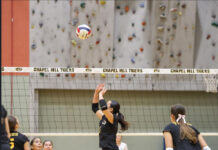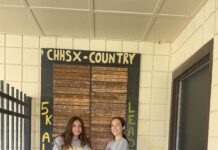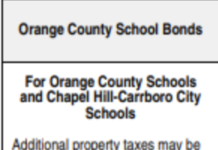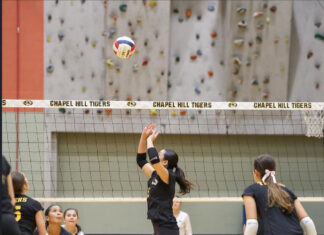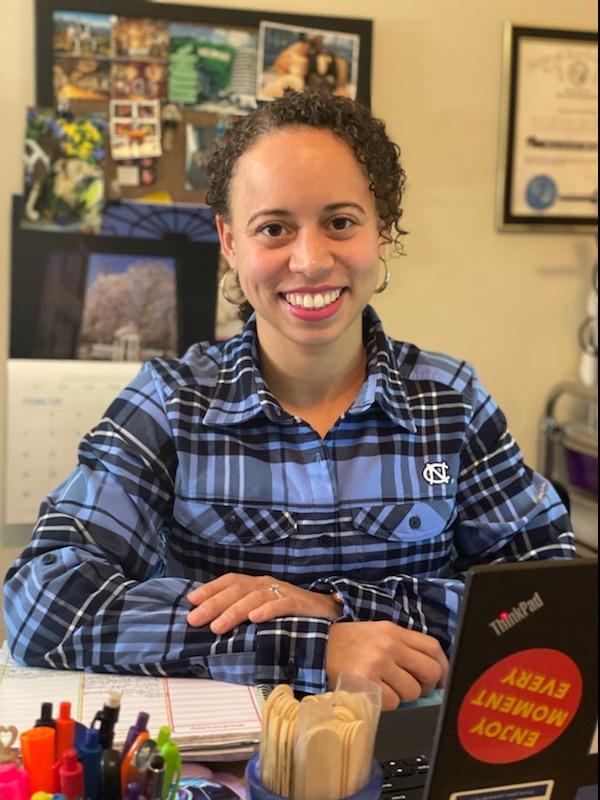
Erica Kinney, a reading specialist at Chapel Hill High School, was named the school’s Teacher of the Year last month, after her peers selected her from a field of over 20 nominees.
Kinney was praised as a teacher who is “extremely student-centered and equity focused” by one of the two individuals who nominated her. The other noted Kinney’s willingness to “go above and beyond to help her children succeed.”
Principal Charles Blanchard, in an email to the school, explained the Teacher of the Year represents “exemplary performance as a member of the teaching staff of the Chapel Hill-Carrboro City Schools,” demonstrating excellence not only in the classroom, but also in educational leadership, civic involvement, and the lives of students.
Proconian talked to Kinney about her work as a reading teacher, her reaction to receiving the award and how she has modified her instruction to fit an online learning model.
What do you do as a reading specialist?
I primarily work with students who are a little bit behind or need additional support with their literacy skills. So, I teach students who may struggle with a couple of concepts that they need help with to become more successful in their other courses, or students dealing with a lot of gaps in knowledge who are a couple grade levels behind their peers: maybe they’re dealing with a learning disability or are learning English as another language. The reason could be any number of things. The class is kind of like reading intervention, but it’s actually a course, so high school students can earn elective credits while getting support with their literacy.
How long have you been teaching, and where has your career taken you besides Chapel Hill High School?
I have been teaching on-and-off for close to ten years. In the public school system, I’ve worked—prior to Chapel Hill—in Vance County and in Durham County, and I have taught pre-K and the third grade before, as well. I also did a little work in Lake County’s private sector. But other than just education, my background is also in social work. I’m a Tarheel— entered in ‘03 and graduated in ‘07—initially majoring as a photo-journalist and then switching to education.
Did you grow up in North Carolina and then begin teaching in the area?
I did,. I am actually a native of Durham, and I’ve pretty much lived in the same tri-county area my entire life, so I’ve worked locally in North Carolina schools and organizations.
When receiving this award, were you surprised?
I was actually traveling at the time of the announcement. I was on the road during the meeting where the announcement was made, and I was very surprised—I did not expect it at all. I’m glad I was able to listen in. I appreciate being recognized because I feel that means I’m on the right track— I’m making a positive difference for my students and my colleagues. But, at the same time, it’s also a little nerve-racking because now that I have that award, I almost feel like I’m under a microscope. I’m going to try to just keep doing what I’m doing and hopefully get even better.
Is there any difference that comes from receiving the award as a reading teacher? Do you feel a certain gratitude winning as a teacher who doesn’t teach a broader subject such as history or math?
I can see the growth or improvement of my students a little differently than other teachers because it’s very targeted. I’ve noticed that even the small things are big in importance, so even a little improvement is a victory. That being said, reading teachers are kind of on an island. I’m the only one at Chapel Hill, and there’s only one at Carrboro and one at East Chapel Hill High. Most people don’t even realize that a reading teacher for high school is a thing, so it was nice to be included in the group and to be recognized for that. So often, being a reader teacher is a support role.
Did you have to do any specific studying to become a reading teacher? Are there any skills or attributes you had to gain to get that role?
My focus in college was on Language Acquisition and in English as Another Language, but my studies were primarily for elementary levels. When I was teaching elementary and going through the process of helping kids learn how to read, I realized that there’s a lot more involved than we are generally taught in a regular university education program. Reading involves a whole lot of Continuing Ed. I typically do training, workshops and webinars every single summer just to keep up on the science of it. A lot of what we know about how people learn to read shifts, and we constantly increase our understanding of how the skill is developed. Becoming a reading teacher requires a separate—at least in this state—license, so I have my general teaching license, as well as a license for teaching reading as a specialty.
In a virtual environment, how have you adjusted your instruction to maximize efficiency? Have you made any significant changes to your strategy or approach to teaching?
Yes, absolutely. It is far more challenging virtually. Usually, in my regular reading classroom, I would be right next to a student to help them. That’s the worst part: not being able to provide that instant feedback. I don’t recognize, unfortunately, the voices of a lot of students, even at this point in the school year, because they’ve chosen other ways to engage. Virtual learning has made me a lot more understanding of all the ways that students can actively participate without just the normal, “read this, tell me what you learned.” We’ve had to get a lot more creative and really be flexible, so maximizing efficiency has often meant paring it down, simplifying the workload—the content we cover—so it’s more manageable.
You always hear just about how stressful it is on students in a virtual learning environment, but what about you as a teacher? What’s your daily routine, and is it sometimes hard to manage frustrations and maintain that schedule?
I think there’s been a very steep learning curve for all of us, so sticking to my regular routine is a challenge, especially because it is just my husband and me at home. We share an office, so sometimes we’re playing musical chairs, deciding who gets to use the room for a conference or a class— he’s an educator, too. Also, I take the reminders I give to my students personally. If I’m telling them they should get out and enjoy the sunshine, I need to get off the couch or away from my desk so that I can do the same thing.
It’s definitely affected my availability, too, because when we were in person, teachers could just take their work home— that’s what most educators do. However, now, I might have students messaging me at 10:30 at night. Sometimes it’s important, or I’m responding to phone calls or emails on the weekends. Everyone has to adapt to the new ways of communication, but it feels like the school day is a lot longer than a regular school day was before. There is no real haven from school anymore.
In your mind, what do you think you did to get this award? What makes your teaching unique or special?
This year, in particular, I have tried a lot more to focus on getting to know my students as individuals. Because I don’t have assessment data—the work samples that I’d like—I don’t really have much to go on, so it’s been more important for me to work on building relationships with them rather than focusing on drilling concepts and getting these assignments taken care of. That’s probably made the biggest difference, especially with their families. I’ve been able to connect more with parents, as all of us are navigating these tough times. We can support each other mutually, so that is what definitely made a huge impact.
Outside of teaching what are some hobbies or pastimes you enjoy?
Well, I’m a huge foodie, so I love trying new foods and new restaurants.. At home, we love cooking— I love baking, personally. I love to travel, which, obviously, the pandemic has put a cramp on right now. But, it doesn’t stop me from dreaming and exploring options that I will have when the world opens up again. I just enjoy getting out and doing things that are different from the norm. Breaking up my routine—as much as I need to stick to my routine—helps me maintain my sanity. I also like doing things that are fun: shopping, going for bike rides, anything that can break up the monotony for a bit.
Lastly, if there is anything you would like to add, go ahead.
I would just like to give a shout-out to my students whom I’ve had the pleasure of working with this year, and also for so many of my colleagues. No good deed goes unnoticed, and we are very well aware of the work that so many people are doing day-in and day-out—including students—to maintain and to keep going. I really hope that we can all keep at it because the year is almost over. The end of the school year will be here before we know it, and there has been such a great opportunity for growth throughout this whole situation. I hope that people hold on to that— don’t count it as a loss. We still have an opportunity to bring some positives out of this odd situation we’re all stuck in.


